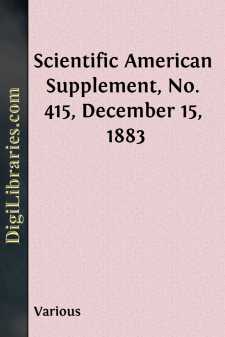Categories
- Antiques & Collectibles 13
- Architecture 36
- Art 48
- Bibles 22
- Biography & Autobiography 813
- Body, Mind & Spirit 142
- Business & Economics 28
- Children's Books 17
- Children's Fiction 14
- Computers 4
- Cooking 94
- Crafts & Hobbies 4
- Drama 346
- Education 46
- Family & Relationships 57
- Fiction 11829
- Games 19
- Gardening 17
- Health & Fitness 34
- History 1377
- House & Home 1
- Humor 147
- Juvenile Fiction 1873
- Juvenile Nonfiction 202
- Language Arts & Disciplines 88
- Law 16
- Literary Collections 686
- Literary Criticism 179
- Mathematics 13
- Medical 41
- Music 40
- Nature 179
- Non-Classifiable 1768
- Performing Arts 7
- Periodicals 1453
- Philosophy 64
- Photography 2
- Poetry 896
- Political Science 203
- Psychology 42
- Reference 154
- Religion 513
- Science 126
- Self-Help 84
- Social Science 81
- Sports & Recreation 34
- Study Aids 3
- Technology & Engineering 59
- Transportation 23
- Travel 463
- True Crime 29
Scientific American Supplement, No. 415, December 15, 1883
by: Various
Categories:
Description:
Excerpt
THE GERMAN NATIONAL MONUMENT.--WAR AND PEACE.
In our SUPPLEMENT No. 412 we gave several engravings and a full description of the colossal German National monument "Germania," lately unveiled on the Niederwald slope of the Rhine. We now present, as beautiful suggestions in art, engravings of the two statues, War and Peace, which adorn the corners of the monumental facade. These figures are about twenty feet high. The statue of War represents an allegorical character, partly Mercury, partly mediæval knight, with trumpet in one hand, sword in the other. The statue of Peace represents a mild and modest maiden, holding out an olive branch in one hand and the full horn of peaceful blessings in the other. Between the two statues is a magnificent group in relief representing the "Watch on the Rhine." Here the Emperor William appears in the center, on horseback, surrounded by a noble group of kings, princes, knights, warriors, commanders, and statesmen, who, by word or deed or counsel, helped to found the empire--an Elgin marble, so to speak, of the German nation.
WAR. THE GERMAN NATIONAL MONUMENT. PEACE.
A writer in the London Lancet ridicules a habit of being in great haste and terribly pressed for time which is common among all classes of commercial men, and argues that in most cases there is not the least cause for it, and that it is done to convey a notion of the tremendous volume of business which almost overwhelms the house. The writer further says that, when developed into a confirmed habit, it is fertile in provoking nervous maladies.
At a recent conversazione of the London Literary and Artistic Society, Mr. Sellon read a paper upon this subject. Having expressed his belief that mere considerations of health would never dethrone fashion, the lecturer said he should endeavor to show on art principles how those who were open to conviction could have all the variety Fashion promised, together with far greater elegance than that goddess could bestow, while health received the fullest attention. Two excellent societies, worthy of encouragement up to a certain point, had been showing us the folly and wickedness of fashionable dress--dress which deformed the body, crippled the feet, confined the waist, exposed the chest, loaded the limbs, and even enslaved the understanding. But these societies had been more successful in pulling down than in building up, and blinded with excess of zeal were hurrying us onward to a goal which might or might not be the acme of sanitative dress, but was certainly the zero of artistic excellence. The cause of this was not far to seek. We were inventing a new science, that of dress, and were without rules to guide us. So long as ladies had to choose between Paris fashions and those of Piccadilly Hall, they would, he felt sure, choose the former. Let it be shown that the substitute was both sanitary and beautiful, capable of an infinite variety in color and in form--in colors and forms which never violated art principle, and in which the wearer, and not some Paris liner, could exercise her taste, and the day would have been gained....












